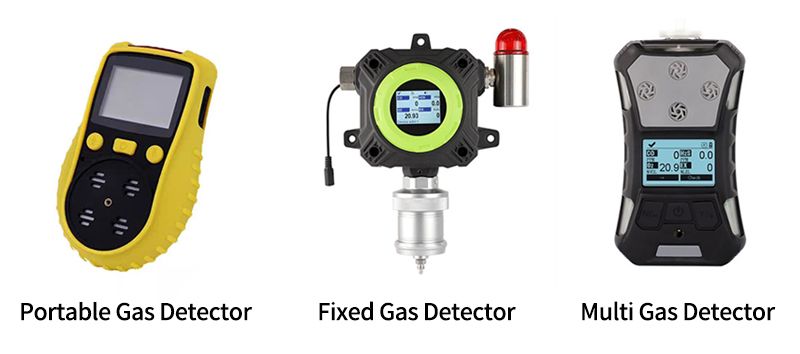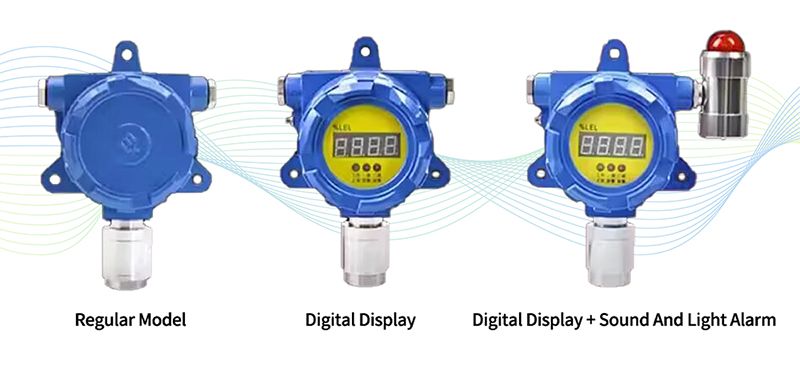A gas detector is a vital safety instrument utilized to monitor and analyze the presence of hazardous gases in various settings, including industrial workplaces, confined spaces, and environmental monitoring. As industries expand, and environments become more complex, the need for accurate and reliable gas detection is paramount. Whether ensuring the safety of workers in confined spaces, monitoring emissions to protect the environment, or preventing potential hazards, the choice of a gas detector holds significant implications. With a multitude of options available, navigating through the selection process can be overwhelming. At present, GasDog offers many types of gas detectors, such as portable gas detectors, fixed gas detectors, multi-gas detectors, combustible gas detectors, toxic gas detectors, and VOC gas detectors.

How to Select the Right Gas Detector?
- Define Your Needs: The first step in choosing a gas detector is to define your needs and objectives. Consider the type of gas you need to monitor, the environment in which the detector will be used, and the specific application. Different environments may require different sensors or detection principles. For example, confined spaces, industrial environments and laboratories each have different requirements.
- Understanding Gas Detection Principles: Familiarise yourself with the various gas detection principles available, such as catalytic, electrochemical, infrared and photoionization detectors. Each principle has advantages and limitations that affect the suitability of the detector for different situations. Understanding these principles will enable you to make an informed decision based on your specific requirements.
- Determine the Environment and Target: Different detection environments and detection targets require different gas detectors. Therefore, before selecting a gas detector, firstly, determine the use of the environment and detection objectives. For example, the need to detect gas leakage, Methane, Carbon Monoxide and other combustible gases, you need to choose a combustible gas detector; if you need to detect Chlorine, Ammonia, Ozone, Formaldehyde, Sulfur Dioxide and other toxic gases, you need to choose a toxic gas detector; if the equipment needs to be installed in a fixed location and need to continuously monitor the place, such as factories, warehouses, laboratories, tanks, mines, pipelines, etc., then you need to choose a fixed gas detector; if the environment is likely to be a mixture of gases, then a multi-type detector is the most appropriate choice, such as the Gas Dog 5-gas-explosion-proof multi-gas detector; If you want to detect compounds that evaporate from liquid or solid materials, such as Formaldehyde, Benzene, Toluene, etc., which usually originate from industrial processes, automotive emissions, construction materials, etc., you need to choose a volatile organic compounds gas detector.
- Determine the Measuring Range and Sensitivity: Different gas detectors have different measuring ranges and sensitivities, which need to be determined according to actual needs. Measuring range refers to the range between the minimum and maximum concentration of a gas that a gas detector can detect. Sensitivity is the ability of the gas detector to respond to changes in gas concentration. When the gas concentration to be detected is low, it is necessary to choose a gas detector with high sensitivity; while when the gas concentration to be detected is high, it is necessary to choose a gas detector with a large measuring range.
- Determine the Response Time and Stability: Response time refers to the gas detector in the detection of gas concentration changes and the time to issue an alarm. Selection needs to be based on the real need to choose the appropriate response time. Stability refers to the detection accuracy and error of the gas detector in the process of long-term use.
- Determine the Type and Number of Sensors: The type and number of sensors in a gas detector are also important factors. Different types of gas detectors may accept different types of sensors, and some gas detectors are equipped with multiple sensors to detect multiple gases at the same time.
- Over-Limit Alarm: Over-limit alarm means that when the gas concentration detected by the detector exceeds the set threshold, it will emit a sound or flash a warning light to prompt the user, when choosing the gas detector, you need to ensure that it has a good over-limit alarm function.
- Display Mode: The display mode refers to the way the gas detector's detection results are presented, usually by the digital display, bar graph display, LCD and other ways, you need to choose the appropriate display mode according to the actual needs.
- Calibration and Maintenance: Regular calibration and maintenance are essential to ensure the accuracy and reliability of the gas detector. Choose a gas detector with convenient calibration procedures and easy-to-replace sensors to ensure long-term stable operation and prolong the service life of the instrument.
- Determine Battery Life and Ease of Use: Gas detectors use battery power, so battery life and ease of use are also important factors. You need to choose a gas detector that has a long battery life, is easy to replace and easy to operate.

Conclusion
In conclusion, to choose a gas detector with excellent performance and reliable quality, you need to understand your requests, gas detection principle, application environment, detection target, measurement range, sensitivity, response time, stability, over-limit alarm, sensor type and number, and other factors, and choose the most suitable gas detector through comprehensive consideration.
